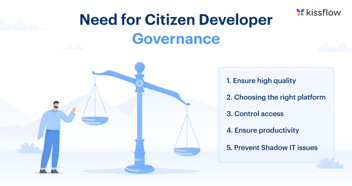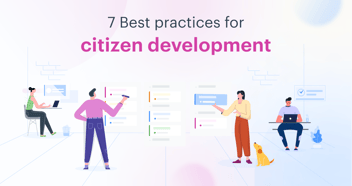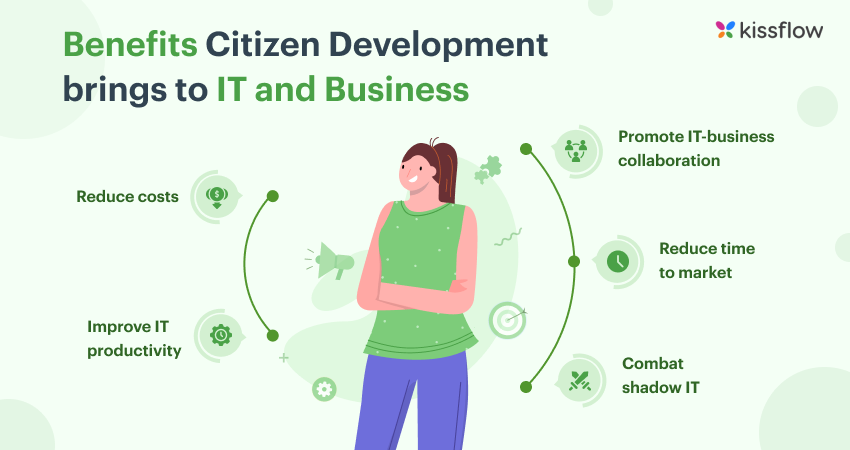Related Articles

5 MINUTES READ
Why Do You Need Governance In Citizen Development | Kissflow
5 MINUTES READ
Best Practices for Citizen Development Success.webp?width=500&height=300&name=Citizen-development-benefits-to-business-IT%20(1).webp)
Team Kissflow
Updated on 23 Apr 2025 • 5 min read
In the last few years, we have entered a stage where there’s no business without IT. As disruptive new technologies and processes place new demands on businesses, IT is relied upon to create digitally enhanced solutions and improve competitiveness.
But with the demand for software solutions and apps growing at a breakneck pace, many IT departments are struggling to fulfill every request that comes in from the business. Developer shortage is a real thing, and it’s creating a mismatch between IT interests and organization preferences. The good news? Citizen developers are using no-code platforms to bridge the gap between IT and business.
Citizen IT developers are fast becoming an invaluable asset for organizations. Empowered by LCNC tools, these developers can unlock new efficiencies and contribute to the digital transformation efforts of the business. Below, we dive into how citizen developers bring IT and business together and how you can scale up through citizen IT development.
Citizen developers are business users from various departments with the ambition and determination to create their own applications. They are problem solvers by change and use low-code no-code platforms to design workflows and processes. Citizen development is typically carried out in runtime environments using methods sanctioned and approved by IT.
As digitization continues to accelerate, more employees are becoming citizen developers and supporting IT through task sharing. In many companies, citizens and IT developers are working together to handle incoming requests. At the same time, citizen development frees IT to focus on other business areas, such as sales and marketing, operations, or field services.
Citizen development brings advantages for both IT and business teams. These two units are typically siloed from each other, but citizen developers can unite them by serving as enablers of technology and business objectives.

Here are some key benefits of embracing the citizen IT movement:
When citizen developers create their own apps, IT is less overwhelmed and significantly more productive. Non-IT employees can develop business applications to solve problems, whereas internal IT developers can focus on more critical issues like legacy modernization, enterprise-wide applications, and core-system extensions.
Citizen IT development decreases application maintenance costs and maximizes resource sharing. It also reduces the need to hire professional developers or purchase third-party applications.
By empowering business users and streamlining internal data and systems, citizen development platforms save companies millions of dollars in development costs.
Learn more: Citizen Developer vs Professional Developer
Shadow IT happens when business-side employees source their own solutions without IT’s knowledge and oversight. Citizen development combats this by giving business users tools to create the best citizen developer apps.
The development is done within an IT-approved space, which minimizes the risks related to modernization and security.
Market conditions are constantly changing, which means organizations need to release products and services faster. Rather than force IT to put the pedal to the metal, you can easily achieve this with a citizen development model.
Have employees use an LCNC and citizen development that helps them build apps at ultrafast speeds and provide high-quality services.
Learn more: Gartner on Citizen Development
In previous times, application development was fully left to IT—IT developers didn’t collaborate with other departments. Today, business users without coding and programming knowledge can collaborate with IT to collectively achieve organizational objectives.
To drive such change, citizen developers must be a link, ensuring both IT and business understand and support each other.
The abundance of low-code and no-code citizen development tools has made it possible for business users to build simple but efficient automation apps for themselves. These highly motivated non-tech employees build apps for their own teams and even for other business teams.
This approach to app development improves employee productivity in the following ways:
When you democratize the app development process, you increase the participation of business users in digital transformation initiatives. These employees are fully involved in building the citizen developer apps that make their work easier and help them to save time. This overall improvement in efficiency leads to a happier work environment where more people are productive.
Learn more: Busting the Top 5 Myths In Citizen Development
One of the consequences of digital transformation is that it further aligns business users and IT departments. While citizen development encourages non-IT employees to take initiative, they still rely on IT for governance. This synergizes your teams to work together even better, improving overall productivity across your organization.
Engineers and pro-coders within an organization have a lot of responsibilities that transcend building and deploying low-level applications. Citizen development frees up internal resources that would have been otherwise expended on these low-scope development efforts. This way, IT teams can now focus on building solutions and other technical responsibilities.
Learn more: How Citizen Development Helps Build Technology Outside of IT
Empowering citizen developers is a strategic way to accelerate digital transformation, but without a structured approach, IT teams can become overwhelmed with training and governance requests. Here’s how to equip business users with no-code development skills while keeping IT resources focused on strategic initiatives.
Reduce IT’s direct involvement by setting up a multi-level support system:
This section will help guide organizations in enabling citizen development without burdening IT teams, fostering a balanced approach between innovation and governance.
Encourage your employees to solve complex problems and experiment with technology. This creates an innovative atmosphere that every organization needs to succeed. When employees share their ideas and attempt to develop unique solutions, there’s improved process efficiency. Citizen developers are more likely to yield higher business productivity.
Learn more: How Citizen Development Helps Build Technology Outside of IT
To succeed in citizen development, a company must choose viable and actionable ideas. And despite the nature of those ideas, design-led thinking must be at the forefront of your efforts to drive organizational efficiency and digital maturity.
Learn more: Unlocking the power of citizen development
There’s no shortage of low-code/no-code tools in the market, but you only need one that works for your organization. The platform decision hinges on a few factors, including ease of use, cost, and security.
Choose a user-friendly platform with all the functions your business needs that also fits your budget.
Although citizen developers have modern tech skills, they have an in-depth understanding of business processes, data workflows, and application infrastructure. Consider hand-holding them as they navigate the low-code, no-code platform to inspire confidence and productivity.
Many application vendors also offer citizen developer training, so make sure to check whether that option is accessible to you.
-1.webp?width=260&height=260&name=CD%20Cover%20-%20Mockup%20(2)-1.webp)
Thank you for downloading!
Your IT and business units can work cohesively with citizen development. Kissflow's citizen development platform can free up your IT staff and empower citizen developers to support application development through low-code, no-code platforms.
Kissflow helps business-side employees unlock their citizen developer potential by enabling them to easily create a range of products without coding. It’s time to unite business and IT with the Kissflow work platform.
Related Articles


Welcome.
Let's get started.
To begin, tell us a bit about yourself
By proceeding, you agree to our Terms of Service and Privacy Policy
"The beauty of Kissflow is how quick and easy it is to create the apps I need. It's so user-friendly that I made exactly what I needed in 30 minutes."
Oliver Umehara
IT Manager - SoftBank
A Trusted Choice for Companies Globally




Thank you for signing up
Someone from our team will contact you soon.

Know why all the IT leaders converging at booth #602
Earn a chance to be part of our experience event

Get the first look at the 2024 Citizen Development report
Welcome.
Let's get started.
By proceeding, you agree to our Terms of Service and Privacy Policy
Wondering where to start?
Let's talk!
Connect with our solution experts to gain insights on how Kissflow can help you transform ideas into reality and accelerate digital transformation

This website uses cookies to ensure you get the best experience. Check our Privacy Policy
